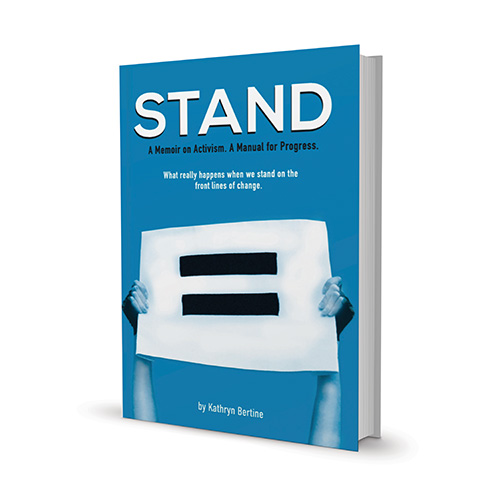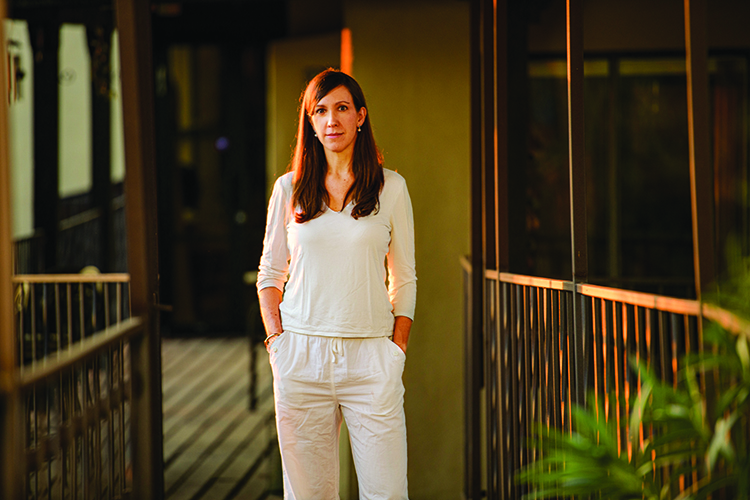Kathryn Bertine ’97 leads the way in opening the Tour de France to female cyclists.
When someone steps into an advocacy role and challenges the system, what takes place behind the scenes? That’s the question Kathryn Bertine ’97 addresses in her new book, STAND: A memoir on activism. A manual for progress. What really happens when we stand on the front lines of change (2021).

Bertine “stumbled into this world of activism” when she noticed the vast gender inequities in road cycling. She’d discovered the sport while on assignment for ESPN in 2006 and, realizing her potential to perform competitively, she continued training.
“Women don’t have access to many races that men do, and for the races where we have access, the pay scale is completely different,” she says. “The women also have shorter distances in cycling. All of these antiquated things made my journalism brain ask ‘Why is it like this?’
“That’s when it kicked into gear: Maybe we can change the system.” Bertine decided to take on the highest-ranking professional cycling competition in the world: Tour de France.
The owners, Amaury Sport Organization (ASO), ignored her initial attempts, so Bertine developed a more comprehensive attack plan: obtain a professional cycling contract in order to have more clout, use her voice as a journalist, and build a team of allies.
In 2012, the steps of Bertine’s plan fell into place. She signed her first pro contract with Team Colavita. Then, she created a documentary on women’s cycling, which also served as informal qualitative research to gauge people’s interest in a women’s Tour de France. And, she reached out to some of the biggest female stars in the sport to “create a pressure group” and launched a petition to ASO for women’s inclusion.
Bertine’s activism culminated in a groundbreaking day. She competed in the first La Course by Le Tour de France in 2014 with her team, Wiggle-Honda Pro Cycling, at age 39 — “proving there are certain sports where women do excel as they age,” she says.
The timing, however, could not have been worse; her personal life was crashing down around her. “If you believe you can change the world, you have to understand that your personal world is also something that can change,” says Bertine, who was in the initial stages of a divorce as she was experiencing the biggest day of her life. “It was a wide-open awakening that activism is not just a day job, it’s entwined with our personal lives. If we go through something devastating, it absolutely affects our work on the activism front lines and vice versa.”
Bertine describes her overwhelming yet victorious personal journey of advocacy in the following intro to her new book, STAND, which is part memoir/part manual. The book offers a window into Bertine’s vulnerability — but, most importantly, sets out “to remind people that we’re all capable of effecting change. We all have the power to make a difference.”
The most pivotal day of my journey in activism went by way too fast, no matter how hard I try to slow the incalculable speed of memory. July 27, 2014. Flashes of color, noise, and blurry people as crowds pressed against the cycling barriers lining the Champs-Élysées. Wind in my ears and the whir of gears as we encircled the Arc de Triomphe. Pounding heart and burning lungs in sync with the peloton of women around me. We were racing at the Tour de France. A race that once banned women. For the last five years, I’d taken up arms — alongside fellow athletes and supporters around the world — against the discriminatory regulations and the bureaucratic dinosaurs that barred us from the roadways of France while men competed in the most iconic cycling race in the world. Finally, on this momentous day, here we were: 125 female professional cyclists in the heart of Paris, racing down the cobblestones of the Champs-Élysées. I reveled in every moment of our prodigious, triumphant day. Inside, though, I was cracking.
A photographer snapped a picture of me on my bike that day — appearing invincible, victorious, joyful, and as though I had my stuff together as I rolled toward the start line of the inaugural La Course by Tour de France. All smiles! All strength! All confidence! All lies.
What cannot be seen in that photograph are the tears streaming down behind my glasses. Beneath my glove, the wedding ring I cannot bear to take off. The fractures and fissures deep within. My body, strong. My soul, lost. I am weak, empty, scared, scarred, scripted, rehearsed, and acting triumphant, fulfilled, confident, collected. In the fleeting pause between each cobblestone, despair seeps through the cracks of stillness and movement. On the outside, I am a warrior for justice. Inside, stone-cold and broken. That day, the weight of worthlessness consumed me. Hiding it seemed better. So I wore the historic victory of our presence at the Tour de France like a mask over the private, ugly pain of advocacy.
When I sat down to write this story — about what we achieved for women’s equality that day — I thought: People don’t want to read about worthlessness. The Brokenness. The Emptiness. Better to skip that stuff. Vulnerability isn’t important. It took me five years to find the courage to disagree.
To write about creating change takes data, and I had plenty of that. But to write about activism requires a mirror. And a steel gut. And a box of tissues. And a reckoning with Vulnerability. In 2019 I taped the photograph of myself, on the bike in Paris, above my computer. As I sat down to write, the woman in the photograph whispered from under her mask: You want to talk about what it takes to make change happen? You want to stop throwing away first drafts? Fine. Then start writing about what really happens when we stand up and fight for what we believe. All of it. What happened in public. What happened in private. About your plan to walk in the woods and not come out. Write about what we need to talk about in our culture, our society, right now, today. That’s how change happens. Facts, schmacts. That’s not enough. Remember what Quixote said? “Facts get in the way of truth.” You’ve got plenty of facts. Now bring in the truth. If you want to write anything worthwhile and meaningful about activism, then you’re going to need to step onto that terrifyingly thin tightrope of vulnerability strung across the abyss of truth and authenticity. Ready?
No.
Ready?
Nope.
Ready?
Ooof.
Okay, Voice. Here we go…
We need to talk about what really happens when we stand up and fight for what we believe. We need to talk about the nasty underbelly of activism. And its beautiful, beautiful wings. We need to talk about the myth of strength, the truth of masks, and the dark side of progress. We need to talk about being broken. Because the universal truth of adulthood is that we’re all a little bit broken. We need to look closely at photographs and wonder about what isn’t there, and shine a light into the cracks and caves of all the things we cannot see. We don’t all need to be activists. But we all do need to talk about how to support those who are out there standing on the front lines of Change.
We need to stop thinking that happy people don’t carry the weight of despair. We need to check in on our strongest friends and ask how they’re really doing. We need to tell those who have their stuff together that it’s okay to Come Undone. We need to talk about demons; ours and others’. We need to talk about suicide. We need to ask Why and embrace How, so we can be the Who, What, and Where if someone needs us. Even if they don’t ask. We need to talk about the frailty of strength and the armor of vulnerability. No, I don’t have those mixed up.
We need to talk about divorce. We need to talk about divorce. We need to talk about it twice because there are two. The one we go through in public and the one we go through in private. We need to talk about pain. And how to channel it. We need to talk about sensitivity. And how to unchain it. We need to talk about the wardrobe of masks, and when to wear them. Or not. We need to talk about depression until we cry tears of laughter from the sweet release of authenticity when we say, out loud, how truly bad it is. We need to laugh. Not just because it feels good, but because Humor is the golden chariot of activism, and laughter is how we hail a cab through the ugly, gridlocked traffic on the road to Progress.
We need to talk about demons, again. Not just talk about them, but to them. We need to talk to our inner beasts until we can look them straight in the eyes, pet their scaly hides, throw a saddle across their razored spines, grab tight the reins, and ride those crazy ogres wherever we so choose. Because we can choose. We need to stop trying to slay our demons and start building stables. We need to talk about how Activism just might be the great big barn where beasts and demons grow into Change and Progress. We need to understand the reality and consequence of what happens when we stand, lead, and fight. We need to talk about it all.
At least I do. How activism bore me, broke me, rebuilt me and became my cornerstone of Self. Stepping onto the tightrope of vulnerability, I decided to write, because standing up and speaking out matters. And also, this: I was lost for a long time, and I needed to write myself home. To figure stuff out. To find peace and clarity. To lock eyes with authenticity. To snuggle with my demons. To confront truth. To help others plot their route into the wilds of activism. To maybe help us all rise. To finally answer the question… Yes, our struggles are worth the journey. At least I’ve got that much figured out.
— Kathryn Bertine ’97 is an author, activist, filmmaker, public speaker, and retired professional athlete.

